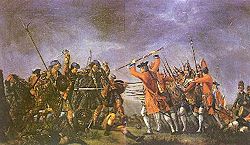Difference between revisions of "Template: Popular article 04 16" - New World Encyclopedia
From New World Encyclopedia
| Line 1: | Line 1: | ||
{{Main page article box| | {{Main page article box| | ||
type=Popular| | type=Popular| | ||
| − | title= | + | title=Battle of Culloden| |
| − | image_name= | + | image_name=battle_culloden.JPG| |
| − | image_desc= | + | image_desc=Battle of Culloden| |
| − | text=The ''' | + | text=The '''Battle of Culloden''' (April 16, 1746) was the last military clash ever to be fought on British soil. It was between the forces of the [[Jacobites]], who supported the claim of Charles Edward Stuart (also known as "Bonnie Prince Charlie") to the throne; and the Royal Army, which supported the Hanoverian sovereign, [[George II of Great Britain]]. Culloden brought the 1745 Jacobite Rising to a close. It was a decisive defeat for the Jacobite cause, and Prince Charles left Britain and went to Rome, never to attempt to take the throne again. |
}} | }} | ||
Latest revision as of 23:20, 16 March 2022
Popular Article: Battle of Culloden
The Battle of Culloden (April 16, 1746) was the last military clash ever to be fought on British soil. It was between the forces of the Jacobites, who supported the claim of Charles Edward Stuart (also known as "Bonnie Prince Charlie") to the throne; and the Royal Army, which supported the Hanoverian sovereign, George II of Great Britain. Culloden brought the 1745 Jacobite Rising to a close. It was a decisive defeat for the Jacobite cause, and Prince Charles left Britain and went to Rome, never to attempt to take the throne again.
